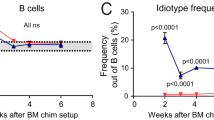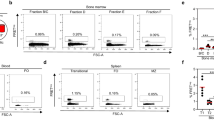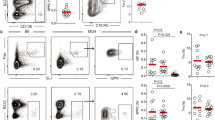Abstract
STUDIES on transgenic mice expressing immunoglobulins against self-antigens1–6 have shown that self-tolerance is maintained by active elimination (clonal deletion)1–3,7, functional inactivation (clonal anergy)4,5,8 of self-reactive B cells, or a combination of both6. We have established and characterized a transgenic mouse line expressing an anti-erythrocyte autoantibody6. In contrast to other autoantibody transgenic lines, about 50% of the animals of this transgenic line suffer from autoimmune disease, indicating a loss of self-tolerance. Here we show that peritoneal Ly-1 B cells (also known as B-l cells9) are responsible for this autoimmune disease in our transgenic mice. A few self-reactive Ly-1 B cells that have somehow escaped the deletion mechanism expand in the peritoneum because of the absence of self-antigen. These Ly-1 B cells are eliminated in vivo by apoptosis once exposed to self-antigen. On the basis of these results we propose a novel autoantibody production mechanism whereby self-reactive B cellssequestered in compartments free of self-antigens may survive, proliferate and be activated for generation of pathogenic auto-antibodies in autoimmune diseases.
This is a preview of subscription content, access via your institution
Access options
Subscribe to this journal
Receive 51 print issues and online access
$199.00 per year
only $3.90 per issue
Buy this article
- Purchase on Springer Link
- Instant access to full article PDF
Prices may be subject to local taxes which are calculated during checkout
Similar content being viewed by others
References
Nemazee, D. A. & Bürki, K. Nature 337, 562–566 (1989).
Nemazee, D. & Bürki, K. Proc. natn. Acad. Sci. U.S.A. 86, 8039–8043 (1989).
Hartley, S. B. et al. Nature 353, 765–769 (1991).
Goodnow, C. C. et al. Nature 334, 676–682 (1988).
Erikson, J. et al. Nature 349, 331–334 (1991).
Okamoto, M. et al. J. exp. Med. 175, 71–79 (1992).
Burnet, F. M. The Clonal Selection Theory of Acquired Immunity (Vanderbilt Univ. Press, Nashville, 1959).
Pike, B. L., Boyd, A. W. & Nossal, G. J. V. Proc. natn. Acad. Sci. U.S.A. 79, 2013–2017 (1982).
Kantor, A. B. Immun. Today 12, 388 (1991).
Herzenberg, L. A. et al. Immunol. Rev. 93, 81–102 (1986).
Hardy, R. R. & Hayakawa, K. Immunol. Rev. 93, 53–102 (1986).
Hayakawa, K. et al. Eur. J. Immun. 16, 1313–1316 (1986).
Marcos, M. A. R. et al. Eur. J. Immun. 19, 2031–2035 (1989).
Williams, J. R., Litte, J. B. & Shiplesy, W. U. Nature 252, 754–755 (1974).
Goldstein, P., Ojcius, D. M. & Young, D. E. Immunol. Rev. 121, 30–65 (1991).
Sedgwick, J. D. & Holt, P. G. J. immunol. Meth. 57, 301–309 (1983).
Czerkinsky, C. et al. J. immunol. Meth. 65, 109–121 (1983).
Bosma, G. C., Custer, R. P. & Bosma, M. J. Nature 301, 527–530 (1983).
Shlomchik, M. J. et al. Nature 328, 805–811 (1987).
Shlomchik, M. J., Aucoin, A. H., Pisetsky, D. S. & Weigert, M. G. Proc. natn. Acad. Sci. U.S.A. 84, 9150–9154 (1987).
Shlomchik, M. et al. J. exp. Med. 171, 265–297 (1990).
Hayakawa, K. et al. Proc. natn. Acad. Sci. U.S.A. 81, 2494–2498 (1984).
Casali, P. et al. Science 236, 77–80 (1987).
Hardy, R. R. et al. Science 236, 81–83 (1987).
Smith, H. R. & Steinberg, A. D. A. Rev. Immun. 1, 175–210 (1983).
Schwarts, R. S. & Datta, S. K. Fundamental Immunology 2nd edn (ed. Paul, W. E.) 819–866 (Raven, New York, 1989).
Casali, P. et al. J. Immun. 143, 3476–3483 (1989).
Benhamou, L. E., Cazenave, P. A. & Sarthou, P. Eur. J. Immun. 20, 1405–1407 (1990).
Hasbold, J. & Klaus, G. G. B. Eur. J. Immun. 20, 1685–1690 (1990).
Russell, D. M. et al. Nature 354, 308–311 (1991).
Dianond, B. & Sharff, M. D. Proc. natn. Acad. Sci. U.S.A. 81, 5841–5844 (1984).
Giusti, A. M., Chien, N. C., Zack, D. J., Shin, S. U. & Scharff, M. D. Proc. natn. Acad. Sci. U.S.A. 84, 2926–2930 (1987).
Author information
Authors and Affiliations
Rights and permissions
About this article
Cite this article
Murakami, M., Tsubata, T., Okamoto, M. et al. Antigen-induced apoptotic death of Ly-1 B cells responsible for autoimmune disease in transgenic mice. Nature 357, 77–80 (1992). https://doi.org/10.1038/357077a0
Received:
Accepted:
Issue Date:
DOI: https://doi.org/10.1038/357077a0
This article is cited by
-
BCR-mediated apoptosis associated with negative selection of immature B cells is selectively dependent on Pten
Cell Research (2009)
-
B Cells and Immunological Tolerance
Journal of Investigative Dermatology (2009)
-
Impaired dendritic cell maturation and increased TH2 responses in PIR-B−/− mice
Nature Immunology (2002)
-
Maintenance and loss of self-tolerance in B cells
Springer Seminars in Immunopathology (2001)
-
Secondary V(D)J recombination in B-1 cells
Nature (1999)
Comments
By submitting a comment you agree to abide by our Terms and Community Guidelines. If you find something abusive or that does not comply with our terms or guidelines please flag it as inappropriate.



